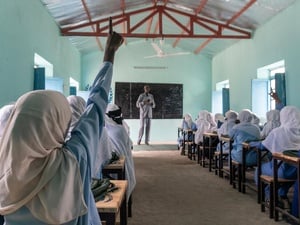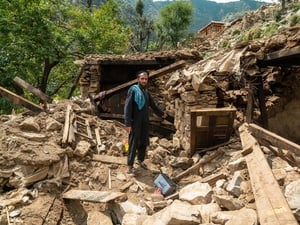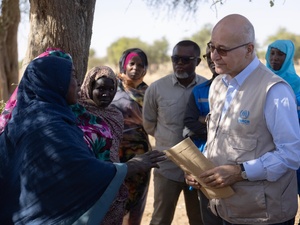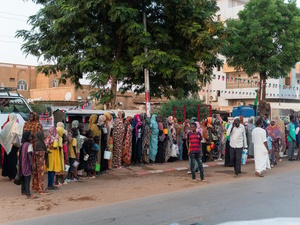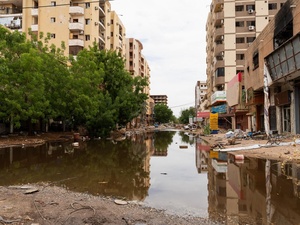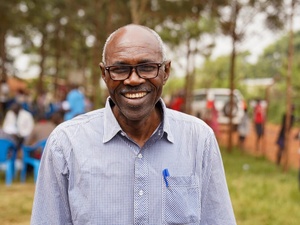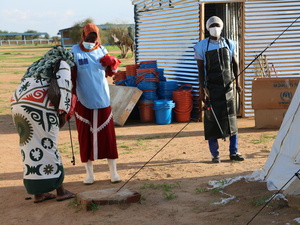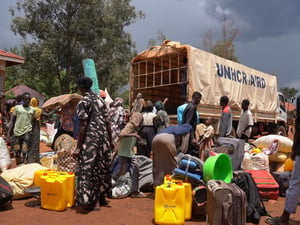Feature: Sudanese refugees running out of options in Ugandan camp
Feature: Sudanese refugees running out of options in Ugandan camp
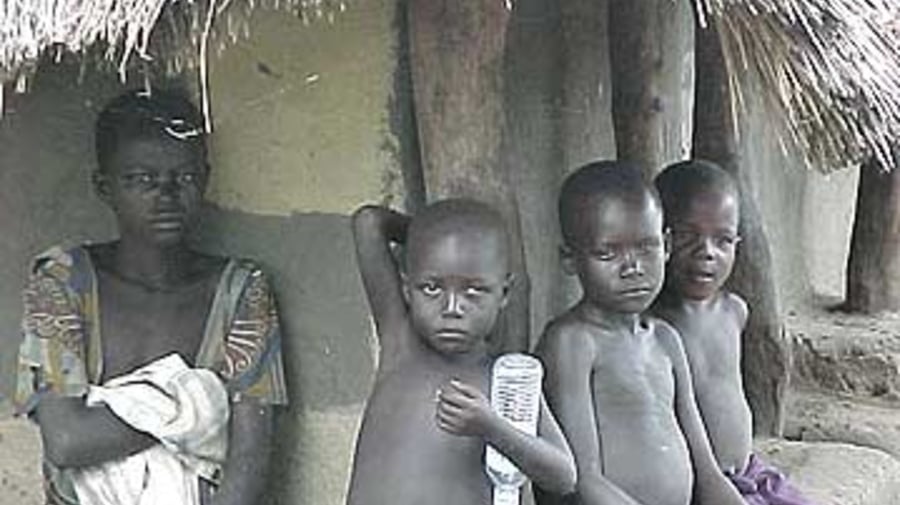
A life of uncertainty for young Sudanese refugees at Maaji 2 settlement in Adjumani district, northern Uganda.
MAAJI, Uganda (UNHCR) - Elisha Kao cannot recall how many times he and his nine children have fled their refugee home in Maaji settlement, northern Uganda, to escape from rebels of the Lord's Resistance Army (LRA).
"Maybe two or three times last year," says the 42-year-old Sudanese refugee, the lines on his forehead creasing as he tries to recollect last year's events. But he vividly remembers the last attack unleashed on Ugandan villagers and refugees by the LRA on the night of May 1 this year.
"It was 10 o'clock at night when the rebels came," recounts Kao, who chairs the refugee welfare committee at the Maaji site. "One of my neighbours ran to my hut and banged on the door, shouting, "Chairman, come out, the rebels have come!"
The sound of gunfire that followed his neighbour's alert sent Kao and his children, who were asleep in adjacent huts, bolting for the nearby bush.
Kao's next-door neighbour, a woman of 40, could not escape the rebel onslaught in time. As she fled from her hut, she ran into one of the rebels, who hit her on the forehead with the butt of his gun and left her to die.
That night, the armed LRA raiders - some 20 men and women - looted 37 refugee homes in Maaji 2 in an orgy of robbery and violence that lasted one hour. Maaji 2 is one of the five sites that make up Maaji, a settlement of some 11,000 Sudanese refugees.
"There were women among the raiders, some with children on their backs," adds Kao.
Early the next morning, Maaji's shocked and terrified residents emerged from their hideouts to take stock of the aftermath of the night's raid. They lost most of their food - maize, sorghum, groundnuts and sim sim, common cereals cultivated in the area. The raiders also stole chicken, goats, clothes and money.
Six refugees were abducted, among them a 14-year-old boy, James Achuto, whose whereabouts remain unknown.
The teenager was among the hundreds of refugee families who were slowly returning to Maaji settlement from where they fled last year in the wake of a series of LRA attacks. The last attack in August 2002 drove more than 6,000 refugees northwards towards Maaji 1 - a safer part of the settlement - and the neighbouring Ukusijoni settlement.
Rebels of the LRA - a semi-religious group led by a self-proclaimed prophet - want to rule Uganda along the lines of the biblical 10 Commandments. They have gone on the rampage in many parts of northern Uganda, killing indiscriminately and looting villages in their path.
A few weeks before the May 1 attack, the young Achuto and his father had returned to clear their family's farmland in readiness for the planting season. His mother was still in Ukusijoni when the teenager was abducted.
Like Achuto's family, Kao and his family had returned to Maaji 2 after nearly six months of squatting in a neighbouring settlement.
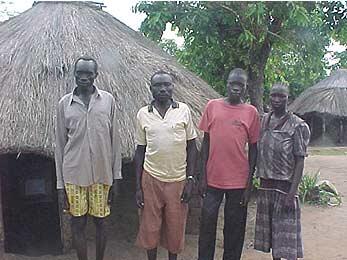
Elisha Kao (left), who chairs the refugee welfare committee at Maaji 2, with some of his children in front of their hut.
"We were encouraged by authorities to return. So we came back in January this year," Kao explains, his tone half-regretful that he had made the decision to come back to the beleaguered settlement.
This time, refugees have not fled the camp following the May 1 attack but are clearly shaken by it, says Kao. People are also worried that this raid may usher in another round of attacks.
The refugees feel caught between a rock and a hard place, says Kao, who left Sudan when his home was bombed in the 18-year civil war. But even in exile in northern Uganda, he has been terrorised by LRA rebels. He hopes that the current peace talks between the government of Sudan and the Sudan's People's Liberation Army (SPLA) may bear enough fruit to enable him and his family to return to his ancestral home in Yei, southern Sudan.
If it happens, it will be the second time that Kao is returning home from exile. Born in Sudan, he spent his early childhood in exile in Uganda. In 1974, at the age of 14, he and his parents took the long road home to Sudan. But in 1994, as civil war ravaged southern Sudan, he fled with his children and ageing parents, one more time, to Uganda. His parents died within months of each other at a transit centre in northern Uganda.
Kao hopes that one day soon, he will be able to take his children back to southern Sudan, a country they barely know. His children think of their homeland as a land of mangoes and milk cows, says Kao with a laugh, an image he thinks has probably evolved from the stories he tells them about southern Sudan.
"They also know that in our home in Yei, when you look in the distance, you can see very, very far," says Kao of his ancestral homeland, a plain that is topographically different from their present home in Adjumani district in Uganda.
But for now, Kao cannot see very far. He is not very optimistic about the future, but says he would like to see his children get a good education and eventually, to witness the return of peace to southern Sudan.


